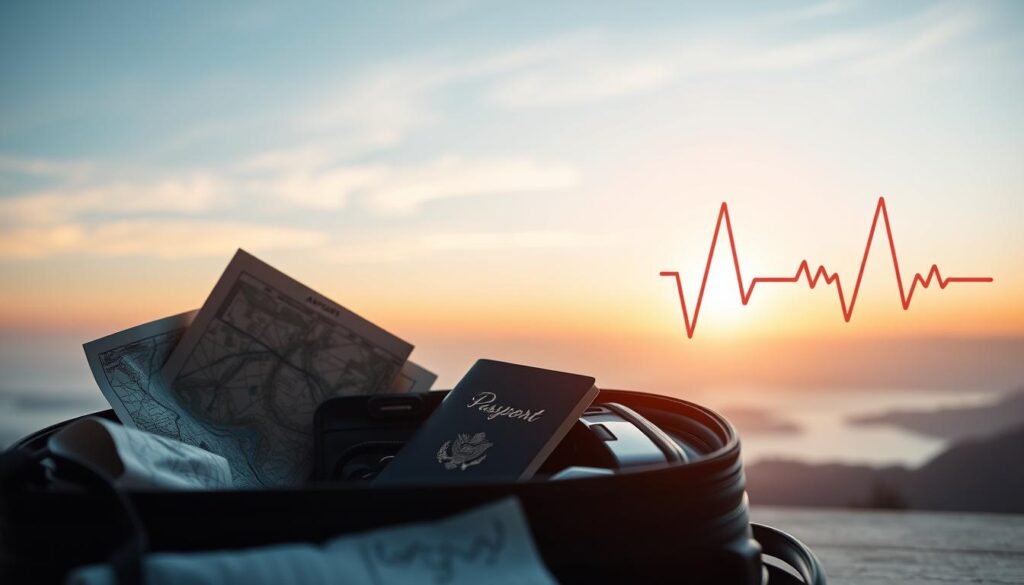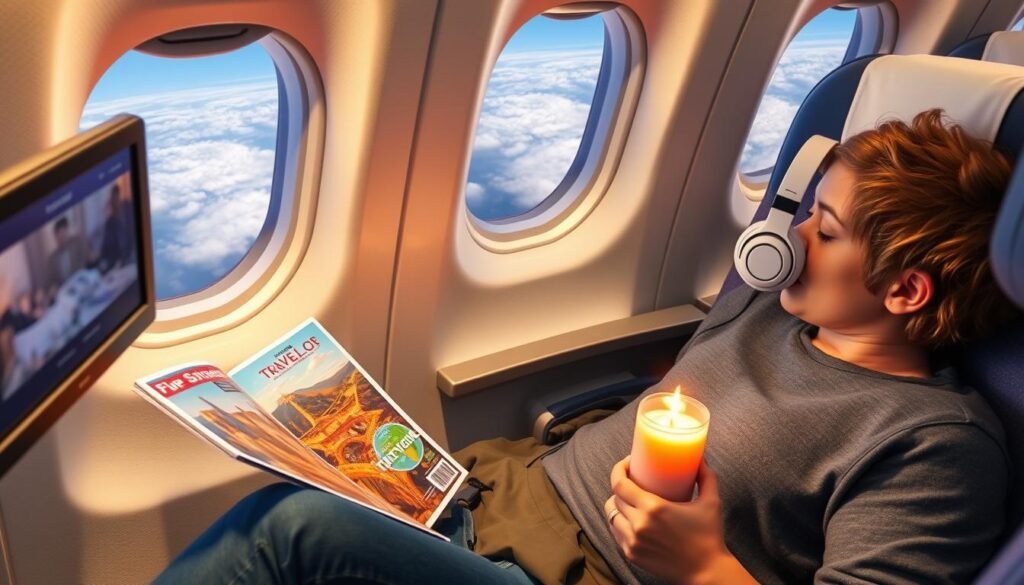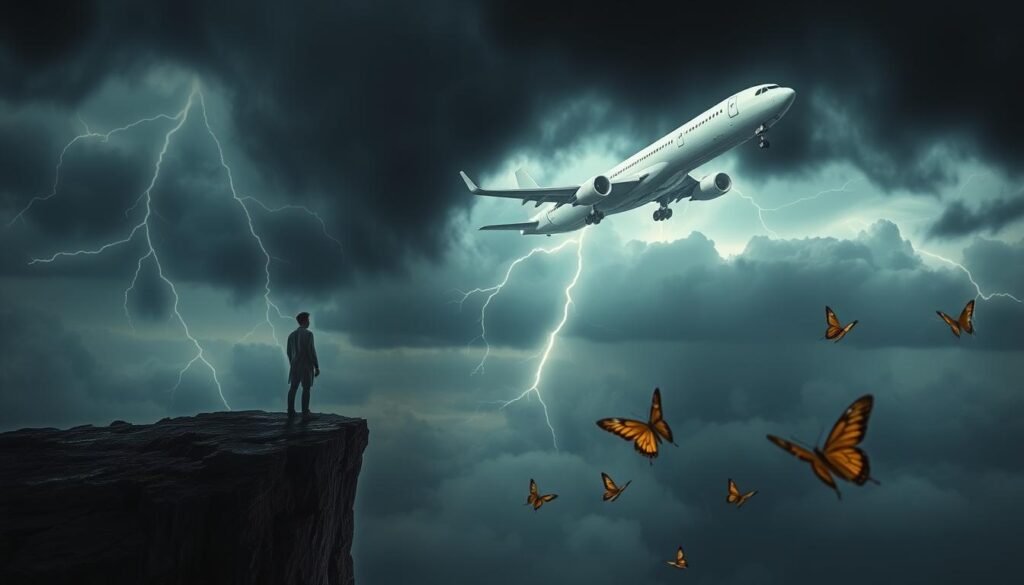About 18% of people in the U.S. deal with an anxiety disorder. This shows how common anxiety is, including the fear of travel. Travel has its stresses, like airline delays. These factors make it crucial to manage anxiety well. People worried about flying, new places, or travel stress overall need good coping methods. This piece offers expert advice for handling travel fears. It helps folks look forward to their trips and enjoy them.
Key Takeaways
- Travel anxiety affects about 18% of Americans due to various factors, including fear of flying.
- Physical activities, even brief ones, can significantly alleviate travel stress.
- Planning for anxiety and having contingency plans can help reduce travel-related fears.
- Meditation and deep breathing techniques are effective in managing anxiety levels.
- Traveling with a supportive companion can ease the fear of flying for anxious travelers.
- Engaging in holistic practices can contribute to long-term resilience against travel anxiety.
Understanding Travel Anxiety
Travel anxiety is quite common. It shows up as worry or discomfort before a trip. People often feel nervous about the unknown parts of traveling. This can make vacations less fun. So, it’s important to know why it happens.
About 19% of people in the U.S. have anxiety disorders. This can make travel fear worse. Bad travel experiences in the past and things like bad weather can trigger this anxiety. Being scared of flying is also very common. It affects more than 90% of anxious travelers.
Not knowing what will happen during a trip can make anxiety worse. Worrying about things at home, like pets or making sure the lights are off, adds to the stress. Delays or cancellations can also make you feel more anxious.
It’s key to know the signs of travel anxiety. They can be mental, like feeling restless, or physical, like feeling shaky. To help, you can try relaxation tricks or keep yourself busy. Reading, playing games online, or listening to music can help during travel.
To better handle travel anxiety, understanding it is the first step. Talking about your fears and getting help when needed can help too. This may include therapy or medication. It’s all about finding the best way to manage your feelings.
Common Causes of Travel Anxiety
Travel anxiety often comes from many factors that can impact a person’s trip planning and enjoyment. A big reason for travel phobia is the fear of flying, which affects a lot of travelers. It can be caused by different things, like air bumps, or the feeling of being trapped in a plane.
Not knowing new places can cause wanderlust woes. Being far from home and hearing bad travel stories can make anxiety worse. The unknowns of new spots can bring worries about health, safety, and meeting new people.
Agoraphobia may also become a part of travel anxiety, especially after the COVID-19 outbreak. Anxiety tends to hit younger people and women harder, especially those with anxiety issues already. For severe travel anxiety, it’s key to talk to experts for help. Here’s a helpful resource.
- Past bad travel experiences
- Fear of flying, or aviophobia
- Not liking new places or big groups
- Too much caffeine or some medicines
- Anxiety or mental health issues in the family
Knowing what causes travel anxiety can help find ways to manage it. By understanding these triggers, people can find solutions and enjoy their trips more.
Recognizing Symptoms of Travel Anxiety
Millions across the world feel travel anxiety, causing distress before and during trips. It mixes physical and emotional responses. Knowing anxiety symptoms early is vital. Signs of travel stress include:
- Rapid heart rate
- Difficulty breathing
- Nausea
- Restlessness
- Insomnia
Thinking about a trip can overwhelm some with discomfort and panic. The fear of flying, or aerophobia, may cause panic attacks. These attacks bring intense fear, sweat, shaking, and confusion.
It’s essential to understand these symptoms. You might notice:
- Nervousness or tension
- Physical discomfort
- Worrying too much about traveling
By recognizing travel anxiety signs, you can look for ways to feel better. Making healthy lifestyle changes helps. Setting routines before trips and caring for yourself are good steps. Keeping in touch with loved ones while away can also make the journey more enjoyable.
Identifying Your Triggers
Understanding what causes your travel worries is key to enjoying trips more. These triggers come from different places. They could be due to general stress or things like making travel plans. If you’re going somewhere new, you might feel scared. This fear can lead to anxiety about traveling.
Some people start missing home about nine days into their trip. Studies show that 70-80% of people with travel anxiety improve by knowing what triggers their stress. It helps to think about what scares you. This could be fear of flying, unknown places, or bad experiences before.
To feel less anxious, try deep breathing or use apps like Headspace or Calm. These methods can calm your nerves. If your anxiety is too much, it’s okay to ask for professional help. They can help you figure out your triggers and how to handle them.
Many travelers get sweaty or their heart beats fast, which affects 40-50% of them. To deal with these feelings, take time to relax. Being willing to change plans and talking to friends or family helps too. This can lower your anxiety.
Knowing what makes you scared of traveling can change the way you feel about trips. When you know your fears, you can get ready for them. This lets you have a better time traveling.

Travel Anxiety: Coping Strategies for a Stress-Free Journey
Managing travel anxiety means creating practical coping strategies. Many worry about vacations, which adds to travel stress. Proper prep can lighten these worries. When you look ahead to a trip, finding ways to reduce anxiety can make it better.
Planning for Your Anxiety
Being proactive can cut down on travel stress. A good idea is to make a travel kit with comforting things. Pack your favorite music, a book, or items that bring back good memories. Knowing what stresses you and planning for it can help. Being prepared gives you tools against feeling uneasy.
Practice Relaxation Techniques
Using relaxation methods before and during a trip helps a lot. Box breathing and guided meditations are great for calming your mind. These methods help with feeling nervous or having a racing heart. Adding affirmations and grounding exercises helps deal with sudden stress. It’s important to look after yourself and use these strategies to enjoy your journey.
For more advice on handling travel anxiety, check out these online resources. They offer great tips for managing stress related to traveling.
Utilizing Distractions During Your Trip
Distractions can be very helpful for those feeling anxious about traveling. Doing something fun can shift your focus away from worries. Activities like reading an engaging book, listening to calming music, or playing games can help. They keep you relaxed and lead to a better travel experience.
For those who often feel nervous while traveling, having entertainment ready is crucial. Long flights or waits can make anxiety worse. Having fun things to do can ease stress and make your time more enjoyable. Practicing visualization or mindfulness can also help, making your trip smoother.
Talking things over with someone you’re traveling with is important. Letting them know what makes you anxious can help them support you. Sharing thoughts about the trip can be comforting, especially if anxiety hits you out of the blue. To get more tips on handling travel anxiety, take a look at this helpful resource.

The Role of Preparation in Reducing Travel Anxiety
Getting ready for a trip reduces travel worries. A solid plan helps people feel less stressed about vacations. Feeling organized and informed makes the daunting parts of traveling manageable. This leads to a more fun travel experience.
Creating a Battle Plan
Building a plan means thinking ahead about what might happen. You should focus on:
- Finances: Make a spending plan for stays, meals, and fun activities.
- Health Concerns: Pack a health kit with needed meds and talk to a doctor about any travel shots or precautions.
- Itinerary: Create a detailed schedule of your transport, stays, and things to do. This gives you control over your journey.
Researching Your Destination
Knowing about your destination is key. Learning about the area’s culture, customs, and how to get around helps you feel sure of yourself. Some key points are:
- Transportation: Look into local buses or subways for easier travel upon arrival.
- Cultural Norms: Learn about local ways to ease into interactions and understand new places.
- Accommodations: Check out reviews to find the perfect place to stay, easing worries about where you’ll sleep.
With good planning, beating travel stress gets easier. Being proactive about organization eases vacation concerns. It lets travelers fully enjoy their trips.
Overcoming Fear of Flying
Dealing with flight fear is key for many. Roughly 40 percent of Americans get scared when flying. This fear starts before the trip but may not match how they actually feel in the air.
Learning how planes work and the strict safety rules helps people manage their fear. This knowledge gives them power over their anxiety.
Using the SOAR App for Fear of Flying
The SOAR app has tools for fear management. It includes calming features like G-force data and videos. This explains how planes fly and handle bumpy air.
Understanding these aspects fights fear based on not knowing. Info like this can make someone less scared of flying.
Traveling with a Supportive Companion
Traveling with a friend who gets it can ease anxiety. They offer comfort and help if you’re nervous. Talking or distracting oneself during the flight also helps.
Telling your friend about any fear triggers is crucial. They can support you better this way. Knowing you’re not alone in your fear helps too, as millions fly daily in the U.S.

| Strategy | Description |
|---|---|
| Education | Understanding aircraft safety and mechanics reduces anxiety. |
| SOAR App | A tool that offers calming features and informative resources. |
| Supportive Companion | Having someone with knowledge of your triggers can ease anxiety. |
| Exposure | Gradually exposing oneself to flying can lead to desensitization. |
| Mindfulness | Practicing relaxation techniques can calm nerves before a flight. |
Education and support help manage flying fears, making travel fun. Check this link for more tips on beating travel anxiety.
Seeking Professional Help for Travel Anxiety
For many people, travel anxiety is a big challenge. It stops them from enjoying trips. Recognizing you need help is crucial. Mental health experts have ways to help you learn how to cope. They can offer therapy or medicine to ease your fears related to travel.
When to Consult a Therapist
Severe travel anxiety means it might be time to see a therapist. This is true if the anxiety upsets your daily life or stops you from traveling. Symptoms can be light or very intense. If you’re avoiding trips because of anxiety, it’s important to get help. This step is key to finding joy in travelling again.
About 10-25% of people feel nervous about traveling, and some have it worse. Fears like fear of flying, open spaces, tight spaces, and heights can make anxiety stronger. Talking to a mental health pro can really help. Therapy helps lessen symptoms for many. Places like Aspire Counseling in Missouri offer help. They have virtual sessions, making it easy to get support from home.
If you’re struggling, consider calling Aspire Counseling at 573-328-2288. Speaking to a therapist can give you new ways to handle anxiety. This can make traveling more fun.
| Condition | Symptoms | Impact |
|---|---|---|
| Aerophobia | Fear of flying | Affects approximately 6.5% of the population |
| Agoraphobia | Fear of open or crowded spaces | Increases isolation and avoidance of travel |
| Claustrophobia | Fear of enclosed spaces | Causes physical symptoms like tightness in the chest |
| Acrophobia | Irrational fear in high places | Can impair experiences related to height |
Conclusion
Travel anxiety is common, affecting many people’s desire to explore. Understanding its symptoms and triggers helps in overcoming fear. This makes journeys stress-free. Planning and calming techniques are key to positive travel.
Educating oneself on travel facts, like flight safety, is important. It helps with fears like claustrophobia. Sites like strategies for a smoother journey offer helpful advice.
Having a positive attitude and recognizing small wins are vital. They make travel enriching and support personal growth. For crowd anxiety, see expert tips for effective strategies.